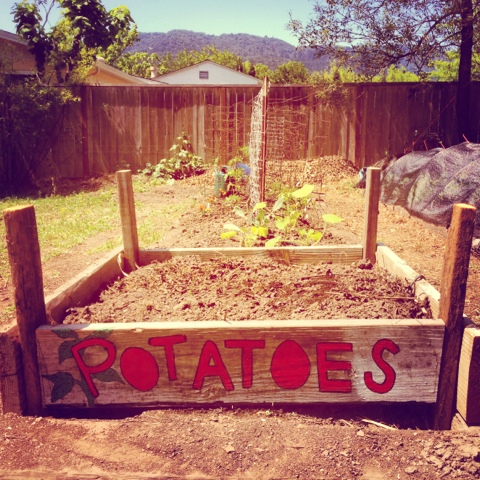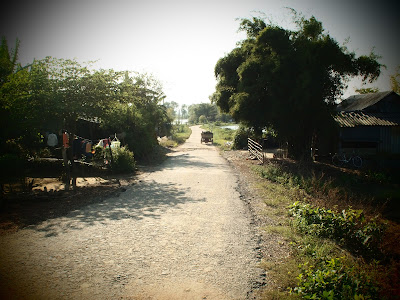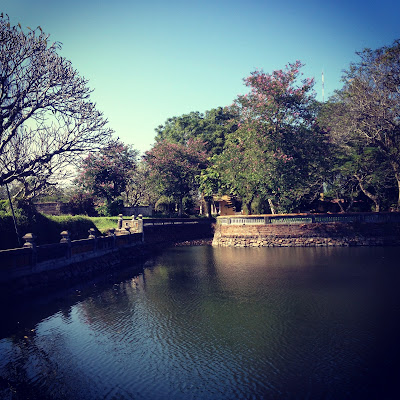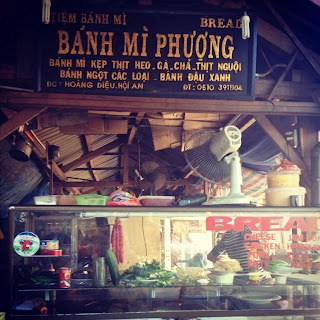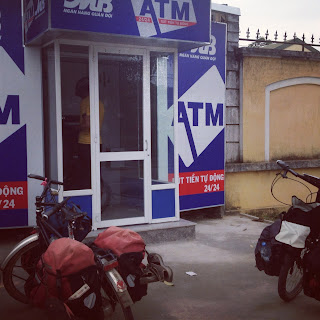
Originally we thought that we would continue south to Savanahket to cross at the popular border at Lao Bao on Highway 9. However, when we found out that highway 12 out of Thakeak was paved to a border crossing that Lonely Planet described as "so out of the way." Sounds good. Within 10 minutes of our late departure we were so captivated by the beauty of the limestone carst formations surrounding us we decided to set up our mini tripod for a action picture with BOTH of us in it. Once two pictures were taken, some American bikers appeared in the the other direction. We immediately struck up conversation.

They had decided to buy some junker bikes in Vientiane and had strapped on their backpacks for a new adventure. Apparently they had seen our bikes in Vang Vieng, assesed that we had all of the right gear and,and in our absence dubbed us team desiel. Modestly, I accept their title. They told us that the road stays as beautiful and remote for the distance. Snapping some final photos we finally get past the 3 km mark sometime around noon.

The afternoon was filled with small villages, water buffalos, Sabaidees and signs with skulls and cross bones indicating that unexploded ordinances had been cleared from an adjacent sight by an organization known as MAG. Laos holds the record of having the most bombs dropped on it per capita of any country in the world. This was a result of the American military trying to stop Vietcong from traversing the Ho Chi Mihn Trail that passed through neutral Laos and Cambodia. Both sides claimed to not be active in the area, but these signs tell a different story.


We stop briefly at a a deep well hand pump funded by World Vision International to test its waters. The hand pump, a standard looking one, functions well and the water tested clean. The community has fully adopted it and it is surrounded by many small kitchen gardens and the concrete splash skirt is clean and fenced in to protect it from wildlife, monkeys excluded. As I test the water Lauren talks to the village people who seem reticent about my activity. She trys briefly to show someone our questionaire, but they simply point down the road indicating that someone down the road knows how to read. We make a hasty retreat, trying not to intrude any further.

As it becomes apparent that darkness is coming we stop for dinner anticipating some wild camping for the evening. Hungrily biting into her sticky rice, Lauren hit a small rock imediately chipping her tooth. This brought a good amount of anxiety, and we briefly thought about returning to Thailand to seek emergency dental care. Taking pictures of her tooth and calling her friends father, who is a dentist in the states, she relaxes and we decide to stay the course.

Having recently printed our Laos water questoinaire, we decided to see if the family running the restaurant we are at if they would like to try filling it out. The whole family gathers round and the younger women are beckoned. I make myself scarce and take pictures of their intrigued and startled children as the sun descends. After making a short attempt to read and fill out the questionaire one of the young women begins to seem objectionable to the task. We are worried that she is either embarassed about not being able to read, or she is becoming increasingly aware of the socio economic disparity between her family the us foreign travelers. Hoping to not make her and her family feel like specimens in a western experiment, we quickly pay and dissapear into the sunset to find a suitable camping spot.

Even in rural Lao, every section of roadside seems to have people living on it or farming nearby, making it difficult to wild camp. Eventually several kilometers down the road we find a clearing behind some bushes just off a turn in the road. We quickly set up a discrete camp and prepare for much needed sleep.
The typical light sleep experienced during wild camping is exaggerated by being in a foreign land and the noisy trucks passing by in the night. This is particularly difficult for Lauren. We wake up covered in dew and quickly break camp hoping to find some food before long. A small roadside stand suffices and we buy some minutes for the phone before entering Vietnam.
The ride continues through the carst limestone formations with little elevation change until the last 15 km before the border when we head towards the top of the mountain. We grind past waterfalls, which provide a nice respite from the heat, especially when coupled with our Steripens for a cold drink.
Border control on the Laos side was simple. We made it to the top of the mountain pass and took a climatic picture at the border monument and descended into Vietnam. With our Visas already in hand we couldn't imagine there would be any trouble at border control. Upon entering the building you could tell we were in a different culture. As I approached the arrivals counter a gentleman looked me right in the eye and put his hand on my penis. This would set the tone for Vietnam.

The counter queue was non-existant and everyone is constantly trying to push their way to the front to be processed. After a few minutes of patiently observing I follow suit. Since this is not a common foreigner crossing, the agent is clearly very interested in the pictures on the pages of our passports, taking an extra couple of minutes for perusal. Once the stamp descends and the passports handed back I launch myself out the door to find Lauren being harrased by locals intrigued by our equipment. Unlike the Loatians or Thais, they are all touching anything they find interesting. Flicking our hands, we scoot away in search of an ATM.
Now for a little back story. When we crossed from Thailand there were many signs that said that Kip, the currency of Laos, could not be exchanged on the Thai side. So we assumed that this must be true on the Vietnam side as well, and we tried to spend all of our residual cash before we got to the border.
When we approach a gentleman boasting a sign with a Kip to Vietnamese Dong conversion rate we realize our mistake. Vietnamese Dong is an even more inflated currency then its Laos counterpart at 21,000 Dong per US $. We ask if there is an ATM nearby. He smirks, points to the coast and says 100 km. Somewhat defeated we exchange our meager amount of cash on hand, a mixture of Laos Kip and Thai Baht. It only amounts to something less than $10.

We coast down from the border, which is notably lusher than the Laos side. After only about 10 km, it begins to rain and we ask some road workers if we can seek refuge in their temporary tarp home. They oblige. Seeing that it is quickly getting dark, but not knowing a lick of Vietnamese we do a lot of hand waving and pointing to inquire if there is a flat space we could put up our tent. Once they realize that we come with our own shelter they eagerly show us to a patch of gravel.

Assembly of our shelter begins at once, and everyone trys to help. It is a clumsy operation as the tent is easily erected by one person. Before we have even completed the task, we are beckoned into the adjacent family home for supper. We enter the one roomed building and sit on plastic woven mats on the floor around a feast that featured rice and water buffalo. The men pulled out a bottle of rice wine and indicate its contents with its molecular formula scrawled on a napkin. Rounds of shots began to circle the room. Being the guest there was extra pressure put on me to drink, but I bowed out before things got too crazy.

Dinner ended casually with the men leaving one by one to lounge in hammocks, smoke cigarettes and sip green tea, while the women dutifully cleared the eating area. By the time we made it out to inflate our air mattresses the men were in their tent playing poker. Shuffling through our bags we extracted our goods and began to inflate. The men took a keen interest in what we were doing and again began to assist us in inflating our beds. One of them sprawled out on the mat to test it out and gave it his full approval.

Gathering our wares we crawled into our small home and tried to sleep. All night we endured the wild winds that violently flapped the loose edges of the adjacent tarp shelter. Sleep was light and when morning came we woke promptly. When I went into the tarp structure to get the camp stove for much needed coffee I found the whole group of men huddled in a cuddle puddle under 2 blankets on the split bamboo sleeping platform. This was another one of those moments when I realized how much better off we are then many of the locals, and how they could never afford something like an inflatable sleeping mat and a sleeping bag.
I slipped into my down jacket, experiencing the sensation of being cold that I have nearly forgotten and fire up the stove. Before long the men start filtering past me inquiring about the stove. I try to explain that it runs on petrol by pointing at the motor bike nearby and then the fuel can. They are of course impressed since the main cooking tool here is wood or charcoal. Feeling more and more like a spectacle and with the morning slipping away from us yet again we sip coffee and break camp. Our comfort is completely broken when one of the workers singles out Lauren and merely says "Money." It is time to go.
We say our goodbyes and thank them profusely, before setting off in search of an elusive ATM. Downs are punctuated by short yet steep ups as we feel our way towards the coast. The morning is shrouded in mist which softens everything, including the "Hellos" we get from children in villages we pass. As the terrain becomes ever flatter, we find more and more children drifting down the road on bicycles wearing quaint little school uniforms. At one point we stop at a road side stand and Lauren becomes completely surrounded.
Shortly after our stop we began to climb the last significant hill between us and the coast. It was a slow grind to the top where we found a small marker/shrine labeled Deo Da Deo. Later we found out that this was the highest pass on the Ho Chi Mihn Trail, and was heavily bombed and poisoned by the Americans to stem the tide of troops and munitions making their way to the south.
Eventually, with the guidance of a young student bike rider, we found our way to a town with hotels outside of Phong Nha-ke Bang national park. We turned off the highway to a larger hotel and asked where the nearest ATM was. The woman pointed East and said in town. Our track became steadily smaller and more rural, and I more skeptical that this would be right way. Stopping several times to confirm that we were on the right track, we finally came across group of guys willing to lead us on their motor bikes.

They guide us to a small dirt road and point down it, I am again extremely skeptical, but with no other options and the evening fast approaching we go for it. The road narrows, the houses on one side are replaced by a sea of rice paddies, then it all turns to mud. Extremely frustrated at this point I stop us yet again to get a fifth or so opinion. I ask a young child, who again points down the same road. He disappears, we stay and discuss, then suddenly reappears with an older and younger woman. Our hand signals and extremely limited vocabulary are failing us completely, and to top it off I am getting hungry. Then, seemingly out of thin air, 4 or so westerners splash into the picture on less than capable bikes.
"Thank goodness you are here!" I proclaimed, "we are looking for an ATM and a place to stay."
"'Fraid that the nearest ATM is still 20 km off," responded the English Speaker, "Lemme take a quick piss."
We hold our newfound excitement and let him empty his bladder in a bush 6 feet off. When he returns he informs us that he works just down the way at a "The Farmstay", but it is all booked up. Thinking that The Farmstay is on a farm, I inquire if we could pitch our tent. He of course needs to ask his boss, but signals for us to follow him down the puddle pocked road.
As we get closer a two story guest house emerges from the peasant shanties on the edge of the rice paddies. When we pull in it becomes apparent that only thing that makes this a farm stay at all is the fact that it is adjacent to farm, and there is in fact no place to pitch our tent as there is a swimming pool, pooltable and bar teaming with backpackers in the way. Moments later the owner pulls in on a beat up old Honda motorbike, gas tank emblazoned with a red star, towing a trailer of Kayaks.
We greet him and explain our situation. He says that he would like to help us out, and before we know it there is a complimentary beer in each of our hands. His wife/business partner informs us that the only available room is $40, which is quite expensive for us, but they will take credit cards so we jump on it. The room is spacious, with a four post bed at its center, a grand bathroom with hot water and a balcony flanking either side. We hang our tent out to dry, eat an expensive dinner, and go to bed early, to prepare for our 80 mile ride to Dong Ha where we are promised that there will be plenty of ATMs.
With earnest we try to wake up early, pausing only to watch the farmers drive their water buffalo to the sprawling rice paddies. We eat and pay our lump sum bill, which might have normally lasted us at least 4 days, throw our legs over our bikes and begin pumping towards the promise land.
The day is filled with rolling hills covered in pine and rubber plantations. It is over cast and relatively uninteresting, making the task seem daunting. At the half way point we pull into a locals motel for lunch, order a bland plate of steamed rice and brined chicken that we washed down with generic colas. When we asked the woman running the counter how much the meal was, she removed all but 25 cents from my wallet. This is about 3 times what we were expecting. There were 40 miles to go and we now had almost no purchasing power.
Not long after lunch we cross the infamous DMZ located in the middle of the country on the Ben Hai river. There was no more indication of the conflict that split the country down its middle; no bomb craters, no fortifications, just a suspension foot bridge running from the highway to a war memorial and more rolling hills covered in perfect lines of trees each bleading out into a cup one white drop at a time.
The day was grueling, our asses hurt, I had become totally hypoglycemic by the end, but we had made it. We ground our way into to urban filth of Vietnam. We had completed our long pilgrimage to our temple of capitalism in the heart of communist Vietnam.






